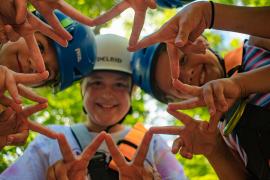My mother never told me there’d be days like these. Challenging? Yes. Difficult? For sure. But nearly impossible? Not so much.
The last full day of camp is always one filled with emotion. But on this day — a day made especially gloomy by unrelenting rain and wind — the emotions went beyond those typically attached to packing up and saying goodbye. They also accompanied the rare, and unlikely, suspension of five outstanding teen leaders just hours shy of our closing ceremonies — and their graduation.
Managing the various tasks and logistics at the end of the season is challenging even under the best of circumstances. Throw a major disciplinary situation into the mix and you can begin to imagine the worst.
How do you find the time to meet with those in trouble, confirm the code of conduct violations, contact parents, arrange for departures, collect their peers, and process the loss all the while staying on schedule so as not to unfairly detract from the planned festivities for campers and staff?
Ugh, days like these.
The immediate response was to seek answers to some obvious questions: Who, what, when, where, why, and how? Of those, the most challenging proved to be “Why?” And answers remain elusive. Some likely culprits include adolescent brain development, peer dynamics, and risk “extroversion” (Wallace, 2017). Together, these three ingredients can result in a toxic stew of poor decision-making even for the most well-intentioned of teens.
Regardless, like it or not, such moments are inevitable. Just ask any high school dean or independent school head. What counts is having a plan.
Ours could be found in the simple consistency of a restorative justice method of discipline. Simply stated, children and emerging adults without a history of bad behavior have a chance to reflect, to atone, and to move forward. Each of these steps is important for the individual and the community (Wallace, 2016).
Reflection, though a seemingly lost art in today’s technology-infused world, is facilitated by the very nature of summer camp, where young people can find the time, the space, and the guidance to think through actions, to recalibrate, and to try again. This “do-reflect-redo” model happens to be something summer camps execute well. We help young people navigate the sometimes difficult but developmentally determinant path from an external locus of control, where the adults in their lives tell them the right choices to make, to an internal one, where they themselves identify best options.
In other words, despite the degree of difficulty posed by discipline, it is not additive to our work. It is our work — and a critical part of what experiential learning at camp is all about.
Another lens through which to view this maturation process is that of Lawrence Kohlberg, who mapped moral development up three levels and across six stages. The last and highest stage is achieved when an individual’s orientation is toward both social rules and one’s conscience. It necessarily incorporates elements of trust, respect, and moral choice that are internalized, not predicated on how others in the immediate environment may react (Davis, 2004).
A good, if grand, goal.
So, what does such reflection yield? Usually, regret and remorse.
According to Margalis Fjelstad, PhD, LMFT, in her Psychology Today piece “Regret vs. Remorse,” the former begets the latter only when the “offenders” are ready to acknowledge the harm brought to others by their infraction. Regret, she says, “has to do with wishing you hadn’t taken a particular action” because of the consequence for you, not necessarily those around you who are aggrieved. Remorse, on the other hand, involves the complicated dance of admitting mistakes (confession), taking responsibility for oneself, speaking to the outcomes for others (and the community), apologizing, and taking steps to make sure the behaviors are not replicated (Fjelstad, 2015).
Therein lies the beauty of restorative justice. It teaches the power of regret and remorse while offering a path toward redemption and return.
For our kids, that process has played out well, teaching them, in their own words, the value of commitment, responsibility, gratitude, safety, community, and legacy.
In the New York Times opinion- editorial “What’s the Use of Regret?” Gordon Marino, a professor at St. Olaf College, references the 17th-century philosopher Baruch Spinoza as positing, “It is out of rashness that we transgress and it is out of rashness that we pound our heads about our transgressions. Our main aim, he believed, should be to avoid acting on impulse and emotion and to be guided by reason” (Marino, 2016).
Such reason may be what keeps our five remorseful teenagers, and others like them, from repeating the same misjudgments in environments less supportive and potentially more retributive.
On letting go and moving on — and being constitutionally unable to avoid imparting a few more life lessons to youth — our closing advice was derived from the article “What to Do When You Really Disappoint Yourself” by author, speaker, and comedian Rex Sikes. He counsels accepting what is, recognizing that mistakes are how we learn, welcoming challenges, focusing on ourselves rather than on the opinions of others, and knowing that rainy days are part of life (Sikes, 2016).
Henry David Thoreau once wrote, “Make the most of your regrets; never smother your sorrow, but tend and cherish it till it comes to have a separate and integral interest. To regret deeply is to live afresh” (About Thoreau, 2015).
Living afresh. That sounds a lot like a summer at camp to me.
Thank goodness for days like these.
References
Davis, D. (2004). Kohlberg’s moral stages. Haverford University. Retrieved from http:// ww3.haverford.edu/psychology/ddavis/p109g/ kohlberg.stages.html
Fjelstad, M. (2015, July 1). Regret vs. remorse. Psychology Today. Retrieved from psychologytoday.com/blog/stop-caretaking-theborderline-or-narcissist/201507/regret-vs-remorse
Marino, G. (2016, November 2). What’s the use of regret? The New York Times. Retrieved from nytimes.com/2016/11/13/opinion/whats-the- use-of-regret.html
Sikes, R. (2016, September 30). What to do when you disappoint yourself! dailyinspirationandgratitude.com. Retrieved from https://dailyinspirationandgratitude .com/2016/09/20/what-to-do-when-you-reallydisappoint-yourself-self-improvement/
About Thoreau. (2014). Henry David Thoreau. Abouthenrydavidthoreau.com. Retrieved from http:// abouthenrydavidthoreau.com/296/2014/06/11/ make-the-most-of-your-regrets-never-smotheryour-sorrow-but-tend-and-cherish-it-till-it-comesto-have-a-separate-and-integral-interest-to-regretdeeply-is-to-live-afresh-henry-david-thoreau/
Wallace, S. (2017, January). Tears and rain. Camping Magazine. Retrieved from ACAcamps.org/resourcelibrary/camping-magazine/tears-rain-disciplinarydebacles-summer-camp-lessons-learned
Wallace, S. (2016, November). The time of our lives: how summer camp tames transition trouble. Camping Magazine. Retrieved from ACAcamps.org/ resource-library/articles/circle-support-restorativejustice-summer-camp
Stephen Gray Wallace is president and director of the Center for Adolescent Research and Education (CARE), a national collaborative of institutions and organizations committed to increasing positive youth outcomes. He has broad experience as a school psychologist, adolescent/family counselor and college professor. He currently serves as director of counseling and counselor training at Cape Cod Sea Camps, a member of the professional development faculty at the American Academy of Family Physicians and the American Camp Association and a parenting expert at kidsinthehouse.com and NBCUniversal’s parenttoolkit.com. He is also an expert partner at RANE (Risk Assistance Network & Exchange). For additional information about Stephen’s work, please visit StephenGrayWallace.com.
© Summit Communications Management Corporation 2017 All Rights Reserved




